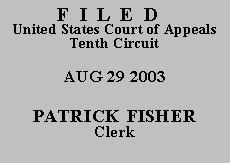

| UNITED STATES OF AMERICA,
vs.
MIGUEL ANGEL BOCH, also known
as Geovani Rios, also known as Hugo
Rodriguez |
|
Mr. Boch was charged with a single count of illegal reentry. The government filed a notice of sentence enhancement based on Mr. Boch's having been convicted of three other felonies. I R. Doc. 2. Mr. Boch thereafter entered an unconditional guilty plea on the charged count and moved the district court to depart downward on the grounds of criminal history over-representation, pre-indictment rehabilitation, and exceptional circumstances. Over the government's opposition, the district court granted Mr. Boch's downward departure motion and sentenced him to a term of imprisonment of 72 months followed by 36 months of supervised release.
In his Anders brief, counsel for Mr. Boch states that after reviewing the record and completing the necessary legal research, he "cannot find any reasonable grounds for appeal." Aplt. Br. at 3. The certification of service indicates that Mr. Boch was served with a copy of the brief and motion to withdraw; he has not responded. See 10th Cir. R. 46.4(B)(2). In Anders, the Supreme Court held that if appointed counsel "finds his case to be wholly frivolous, after a conscientious examination of it, he should so advise the court and request permission to withdraw." 386 U.S. at 744. Where counsel has filed an Anders brief, we must conduct a "full examination of all the proceedings" to determine if the appeal is "wholly frivolous." Id. If we concur in counsel's evaluation of the case, we may grant the request to withdraw and dismiss the appeal. Id.
After a thorough review of the record we conclude there are no meritorious issues for appeal. As to Mr. Boch's conviction, we note at the outset that because a defendant who pleads guilty waives all non-jurisdictional challenges to his conviction, his "only avenue for challenging his conviction is to claim that he did not voluntarily or intelligently enter his plea." United States v. Wright, 43 F.3d 491, 494 (10th Cir. 1994) (citing Mabry v. Johnson, 467 U.S. 504, 508-09 (1984)). However, Mr. Boch has not argued that his plea was involuntary or unknowing, and nothing in the record suggests that it was.
As to the validity of his sentence, the record reveals that the sentence imposed was within the applicable guideline range, that the guideline range was correctly determined, see United States v. Soto-Ornelas, 312 F.3d 1167, 1171 (10th Cir. 2002) (holding that the district court is not limited to considering only the conviction immediately preceding deportation), and that the district court did not exceed the statutory maximum sentence for the offense of conviction. In fact, in light of the district court's downward departure, Mr. Boch received a significantly lighter sentence than he might have otherwise.
Accordingly, we DISMISS the appeal and GRANT counsel's request to withdraw.
Entered for the Court
Paul J. Kelly, Jr.
Circuit Judge
*. This order and judgment is not binding precedent, except under the doctrines of law of the case, res judicata, and collateral estoppel. This court generally disfavors the citation of orders and judgments; nevertheless, an order and judgment may be cited under the terms and conditions of 10th Cir. R. 36.3.
2. After examining the briefs and the appellate record, this three-judge panel has determined unanimously that oral argument would not be of material assistance in the determination of this appeal. See Fed. R. App. P. 34(a); 10th Cir. R. 34.1(G). The cause is therefore ordered submitted without oral argument.